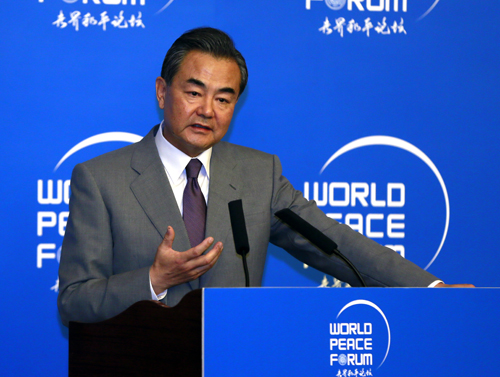 BEIJING, Sept. 16 (Xinhua) — Chinese President Xi Jinping will make clear his view that cooperation will bring mutual benefit while conflict will harm both sides during his U.S. tour, Chinese Foreign Minister Wang Yi said Wednesday.
BEIJING, Sept. 16 (Xinhua) — Chinese President Xi Jinping will make clear his view that cooperation will bring mutual benefit while conflict will harm both sides during his U.S. tour, Chinese Foreign Minister Wang Yi said Wednesday.
Xi will pay a state visit to the United States from Sept. 22 to 25, the Foreign Ministry announced on Wednesday morning.
President Xi’s visit will focus on boosting trust, and trying to address concerns that China and the United States contradict each other when dealing with issues such as international relations and Asia Pacific order, Wang said at the Lanting Forum held by the ministry.
China is a staunch supporter of the current international order. There is no reason why China should challenge it or want to overturn the system in which it is a full member, Wang added.
“Xi’s visit aims to enhance friendly cooperation between China and the United States and contribute to global peace and development. It will surely be a major milestone for China-U.S. relations and world peace and development,” Wang said.
“A major highlight of President Xi’s visit to the U.S. will be his interactions with the American people,” Wang said, adding that Xi will talk with entrepreneurs, teachers and students.
A series of measures to promote civilian exchanges between the two countries will be announced during Xi’s trip, Wang said.
Cooperation agreements will be reached in the fields of finance and trade; energy; climate change; environmental protection; science and technology; agriculture; law enforcement; aviation; and infrastructure.
Wang stressed that relations between the two countries go far beyond the bilateral context and take on a global strategic implication. China and the U.S. working together benefits both countries and the world at large, while frictions in relations undermine both countries’ interests and affect the wider world.
“We hope that both sides will use the opportunity to reaffirm their respective development direction and strategic intentions, their growing common interests and their common responsibility for peace, stability and development,” Wang said.
Xi’s upcoming trip will be the third visit exchanged between the two presidents in the past three years. “It shows just how much both sides value this relationship and how much willing both sides are to deepen mutually beneficial cooperation,” Wang said.
The minister stressed that both countries had the resources and necessity to realize positive exchange and cooperation concerning the Asia-Pacific region.
He noted that the Belt and Road Initiative would create new opportunities for development in many countries while the establishment of the Asian Infrastructure Investment Bank is expected to improve the current financial system and overcome financial bottlenecks.
Wang said Xi will elaborate on the China-U.S. new type of international relations, which features cooperation and win-win deals, putting forward concrete paths to create the community of common destiny.
“Our goal is to ensure sound and steady growth of China-U.S. relations and deliver more tangible results in the building of a new model of major country relations,” Wang said.
Xi will also visit the UN headquarters in New York to attend summits commemorating the 70th anniversary of the establishment of the United Nations from Sept. 26 to 28.
The president will focus on global development, especially for developing countries, during his visit to the UN headquarters.
According to Wang, Xi will announce “important measures” China will take to support the UN which will demonstrate China’s commitment to shoulder its responsibilities and uphold world peace.
Xi will also attend an event on climate change where he will have in-depth discussions with leaders from other countries on ways to address climate change and realize sustainable development.
“We hope China and the U.S. could work together to uphold the UN-centered international order and international system. Both countries could act as strong supporters of the norms governing international relations that are based on the purposes and principles of the UN Charter,” Wang added.

